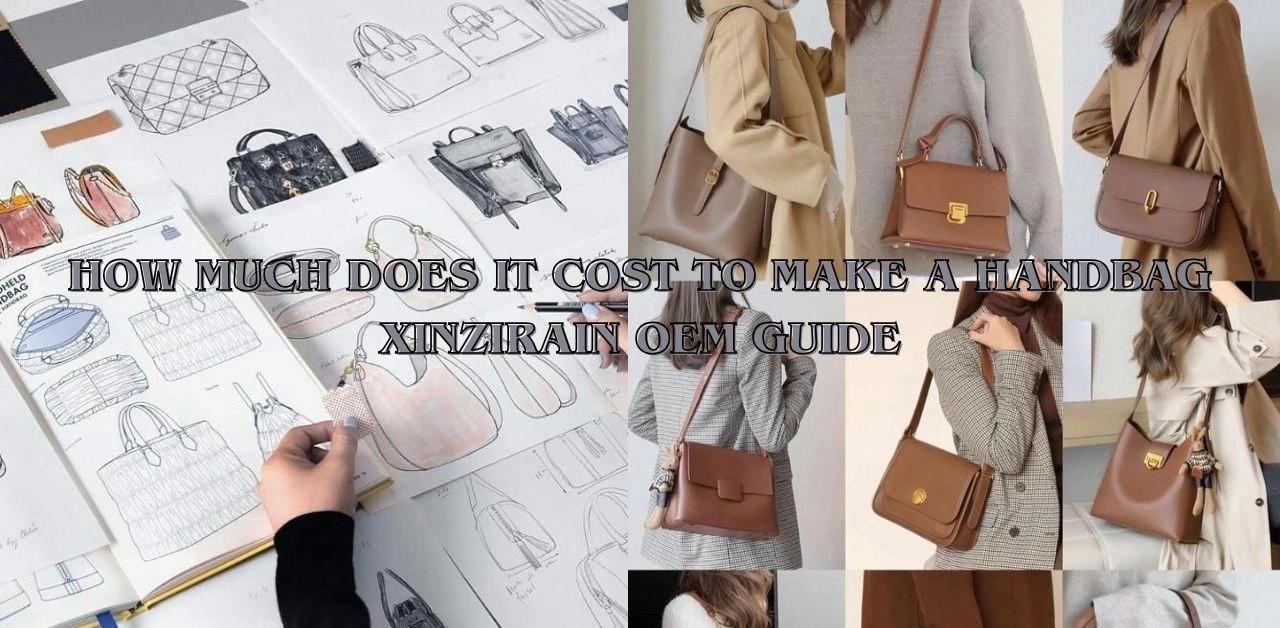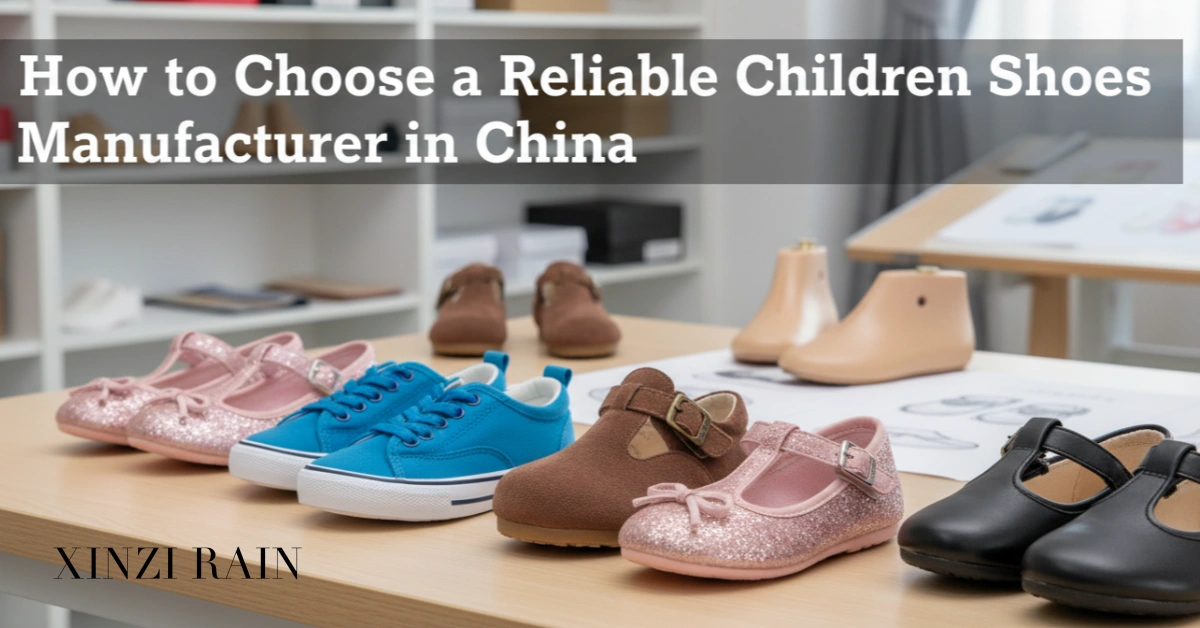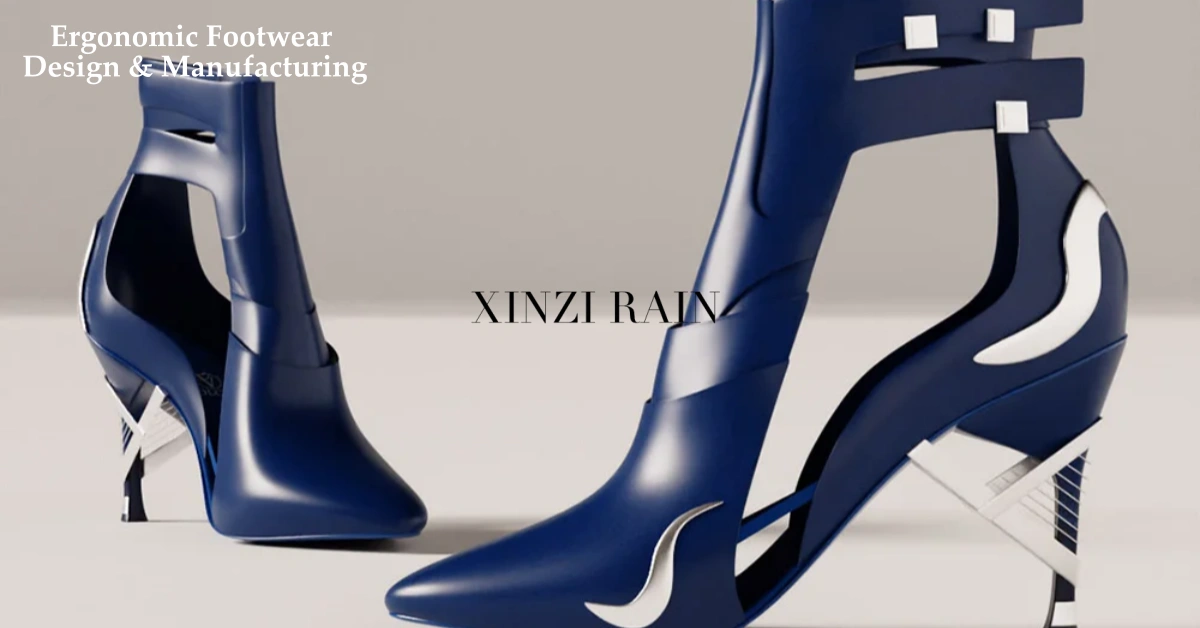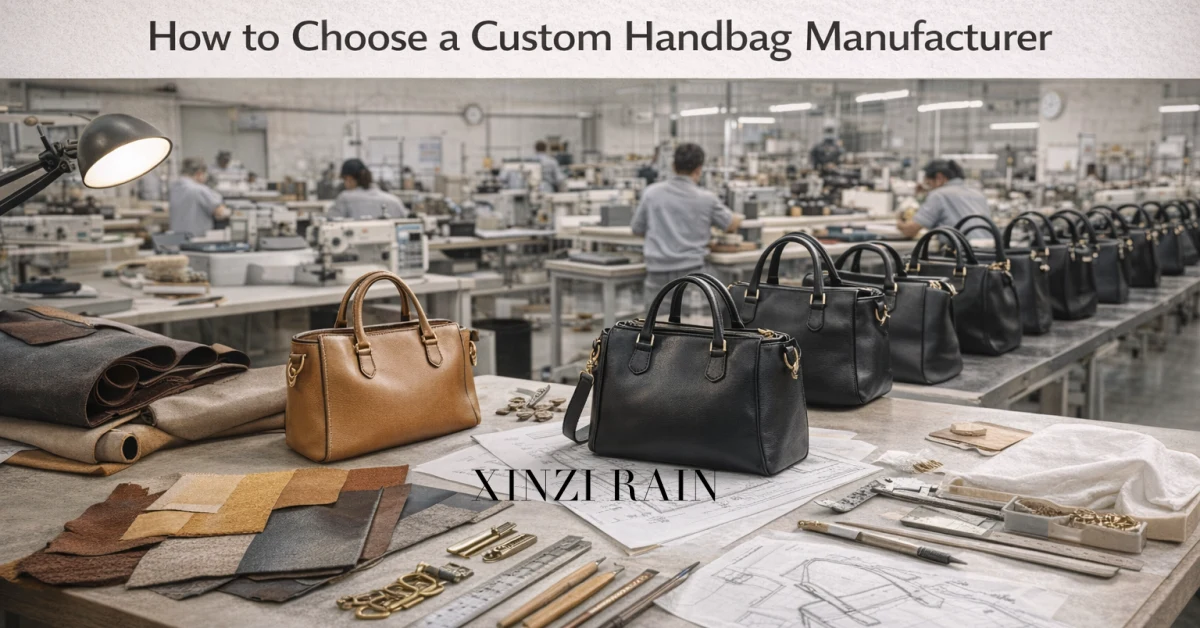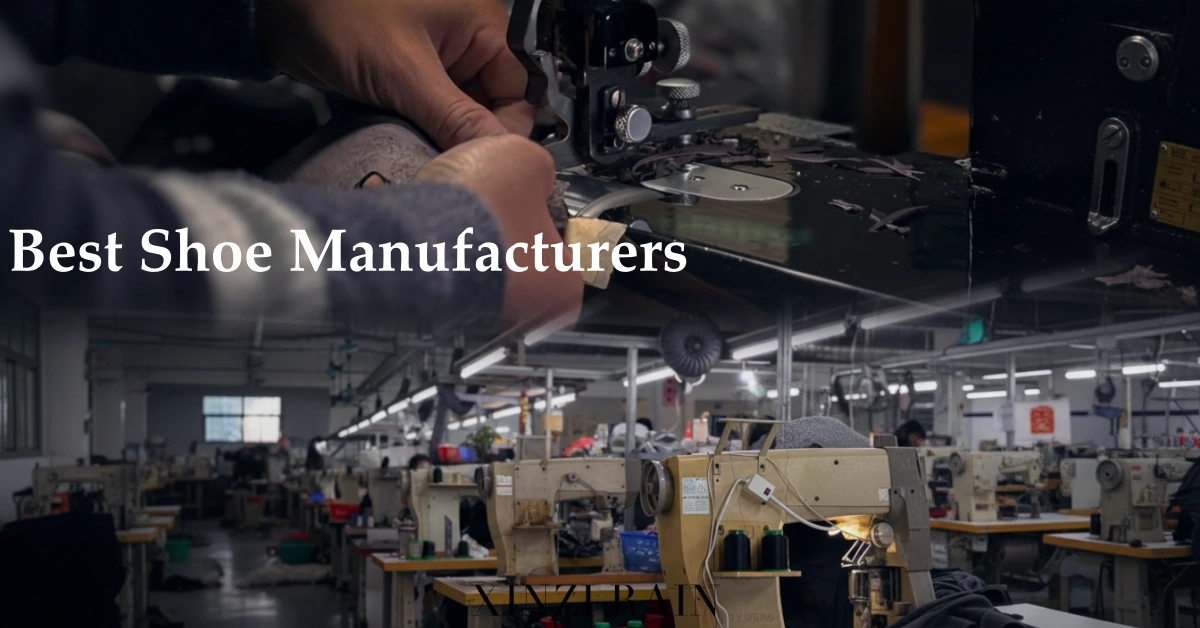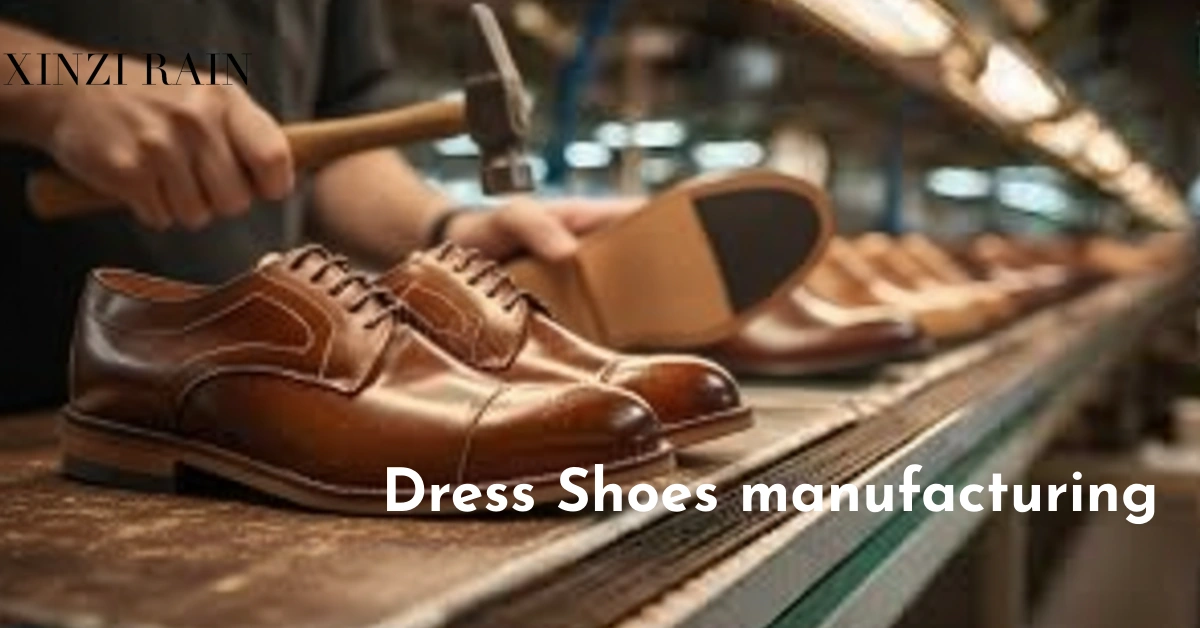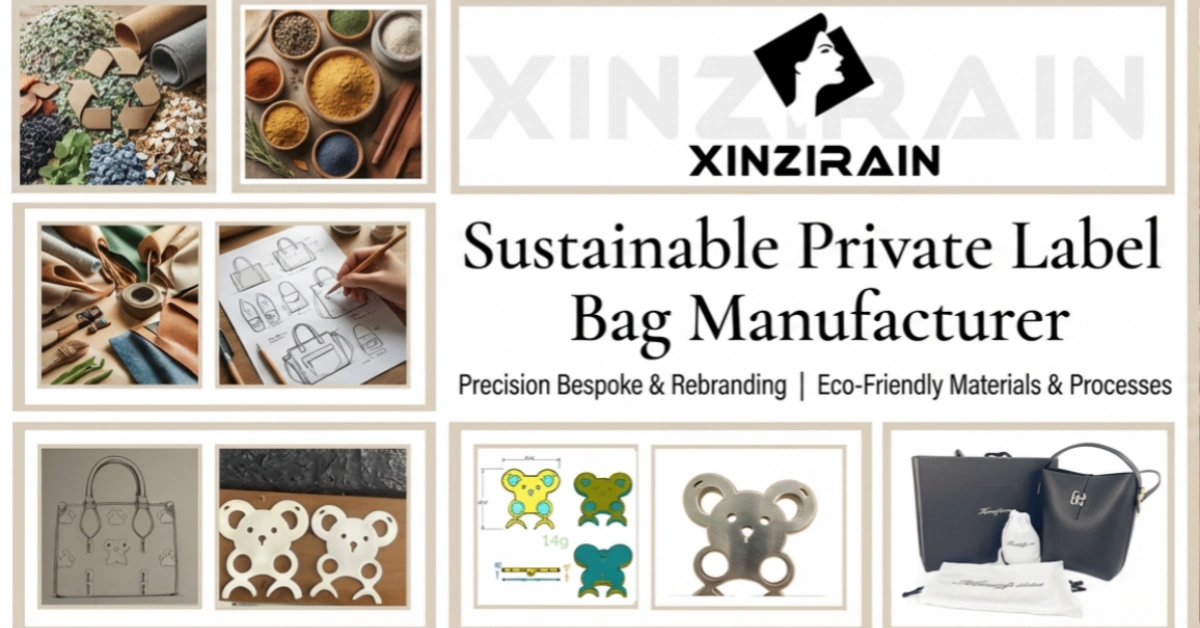When brands start exploring custom handbag manufacturing, one of the first questions that comes up is simple yet critical:
“How much does it actually cost to make a handbag?”
It might seem like an easy question, but the answer isn’t just about a number—it’s about value. The cost of a handbag reflects craftsmanship, the materials used, design complexity, and the expertise of the manufacturer behind it.
At XINZIRAIN, a trusted OEM/ODM handbag manufacturer based in China, we’ve helped hundreds of international brands—from luxury labels to growing startups—turn creative ideas into beautifully made handbags that balance cost, quality, and design integrity.
In this in-depth guide, we’ll break down the full picture behind handbag manufacturing costs so that importers, distributors, and brand founders can make informed, strategic sourcing decisions.
What Defines a Handbag in Modern Fashion?
A handbag isn’t just a container—it’s a statement of personality, craftsmanship, and brand identity.
From minimalist leather totes to structured crossbody bags, the handbag category spans fashion and function. Over time, handbags have evolved from simple utility items to lifestyle accessories that communicate style, sustainability, and even cultural values.
For manufacturers, that evolution means balancing design creativity with production efficiency. Every stitch, every edge coat, and every lining material influences not just the look and feel—but also the manufacturing cost and perceived retail value.
In the B2B world, understanding these details helps buyers communicate expectations clearly and control budgets without sacrificing quality.
How Are Handbags Manufactured?
Handbag manufacturing is a multi-stage process that combines artistry, technology, and precision. At XINZIRAIN, our workflow blends traditional craftsmanship with modern equipment to achieve consistency at scale.
Step 1: Design & Pattern Development
Every project starts with sketches and digital patterns. The dimensions, silhouette, and functionality (pockets, zippers, hardware) are defined. Our in-house designers then create a digital prototype to visualize structure and optimize for material efficiency.
Step 2: Material Sourcing
Material selection shapes both the product’s identity and its cost. Clients choose from genuine leather, PU, vegan alternatives, or eco-friendly textiles. Our sourcing team partners with certified suppliers to ensure durability, texture consistency, and compliance with international standards (REACH, OEKO-TEX, etc.).
Step 3: Cutting & Preparation
Using high-precision CNC cutting machines, each material is cut according to the pattern. Reinforcements, linings, and interlayers are prepared, while metal parts such as buckles, rivets, and zippers are matched to the design.
Step 4: Stitching & Assembly
This is where craftsmanship truly shines. Skilled artisans assemble each part by hand or with industrial sewing machines, ensuring even stitching and strong seams. Reinforced corners and edge painting guarantee structural integrity for daily use.
Step 5: Branding & Customization
From embossed leather logos to metal plaques and screen prints, branding defines a bag’s identity. Depending on your brand DNA, we use specialized processes such as hot stamping, embroidery, or laser engraving to personalize every product.
Step 6: Quality Inspection
Before packaging, every bag undergoes multi-layer inspection: material, stitching, alignment, hardware function, and finish. For OEM orders, clients can request third-party quality audits to meet brand compliance standards.
Step 7: Packaging & Shipment
Each bag is carefully packed—dust bag, tissue paper, customized box if required—then prepared for export with your private label. From our Guangdong factory, we ship worldwide via sea or air freight.
This entire process ensures that the handbag you receive isn’t just a product—it’s a promise of precision, reliability, and craftsmanship.
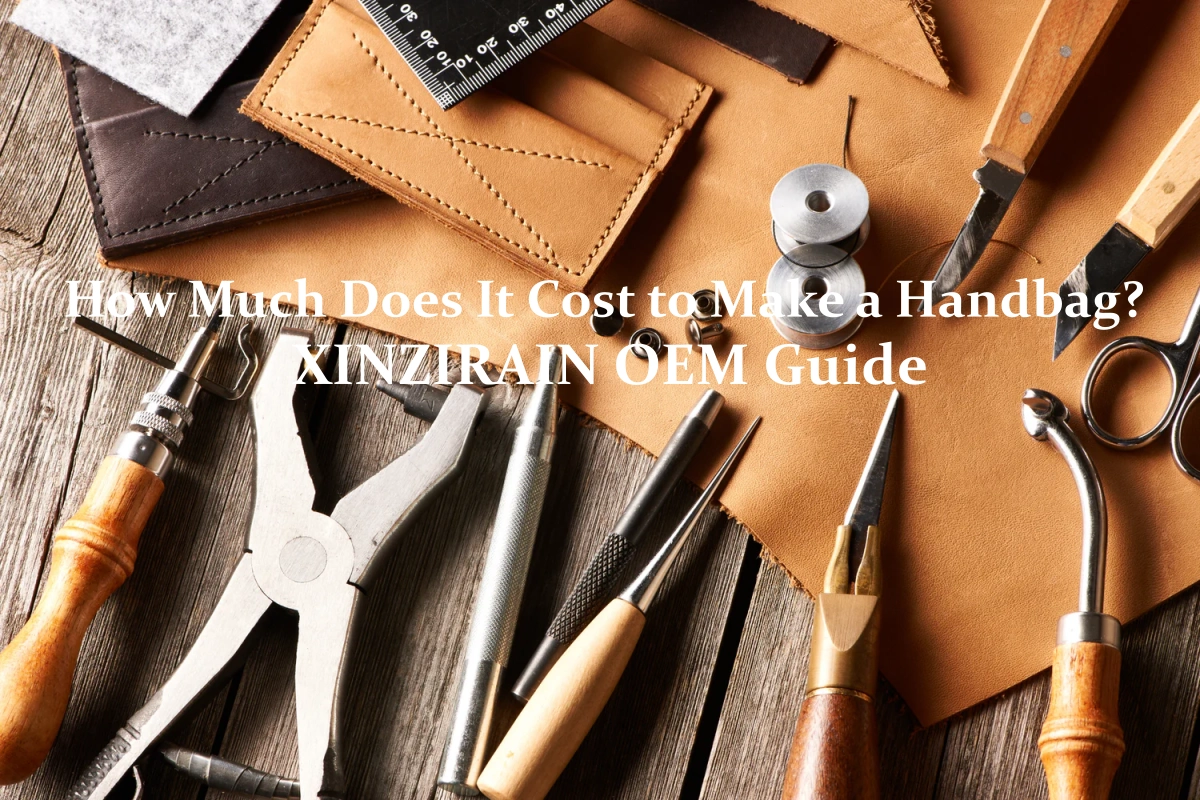
Key Factors Influencing Handbag Manufacturing Costs
Every handbag price is built on a combination of visible and invisible variables. Let’s break them down:
Materials – Leather vs. PU vs. fabric significantly changes the price structure.
Design complexity – Intricate patterns, multi-compartments, and custom molds increase labor hours.
Labor & craftsmanship – Countries with higher wages or artisanal traditions will naturally cost more.
Hardware & accessories – Metal trims, zippers, magnets, and custom molds add up fast.
Branding & finishing – Embossed logos, custom linings, and decorative stitching impact cost.
Quantity & scale – Larger orders bring economies of scale, lowering unit costs.
Logistics & tariffs – Shipping method (air vs. sea), customs, and currency rates influence the final landed price.
Understanding these elements helps buyers set realistic budgets, negotiate effectively, and align cost expectations with target retail price points.
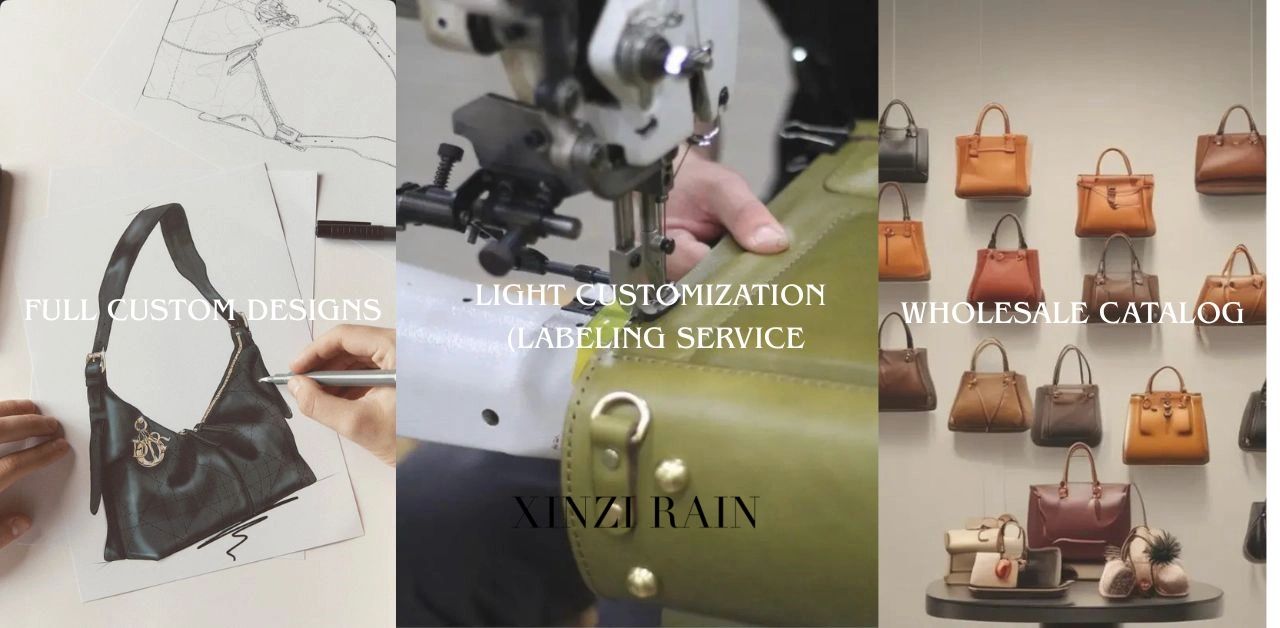
The Role of Materials and Fabrics
Materials can account for 35% to 60% of total handbag manufacturing costs. Here’s how each major category compares:
|
Material Type |
Features |
Best Use Case |
|
Full-grain leather |
Luxurious texture, long lifespan |
Premium collections |
|
Top-grain leather |
Smooth, refined finish |
Mid-to-high-end handbags |
|
PU / Vegan leather |
Affordable, versatile |
Mass-market & sustainable brands |
|
Canvas / Cotton |
Lightweight, eco-friendly |
Casual, travel, promotional bags |
|
Nylon / Polyester |
Water-resistant, durable |
Outdoor & sport styles |
|
Recycled / Organic materials |
Sustainable, brand-friendly |
Eco-conscious collections |
How Material Choice Impacts Pricing
Leather handbags cost more due to raw hide price and processing (tanning, dyeing).
PU or recycled materials reduce cost but may affect perceived brand luxury.
Eco-friendly fabrics attract sustainability-driven consumers—slightly higher initial costs often justify long-term brand positioning.
At XINZIRAIN, we help clients choose the best balance between cost, performance, and aesthetics—so every bag meets both brand and budget expectations.
Branding, Hardware, and Customization Costs
Custom branding turns a generic bag into a brand signature—but it also introduces complexity.
Let’s explore common customization options and how they affect pricing:
|
Process |
Description |
Cost Impact |
|
Embossing / Debossing |
Pressed logo using a metal mold |
Medium (tooling required) |
|
Metal Logo Plate |
Custom die-cast logo attached to the bag |
High (tooling + mold) |
|
Screen / Heat Printing |
For fabric or PU surfaces |
Low to medium |
|
Digital Printing |
For small batch or detailed artwork |
Higher per unit |
|
Embroidery |
Adds tactile branding or patterns |
Medium |
|
Edge painting |
Manual or machine finish on leather edges |
Medium – adds labor |
|
Custom Hardware |
Unique zipper pulls, buckles |
High (requires custom mold) |
These details matter because they influence not only the aesthetic but also the perceived value of the product.
In B2B terms, strong branding elements often increase retail mark-ups and brand recall—well worth the marginal cost increase.
Labor, Location, and Supply Chain Impact
Labor is another significant variable in handbag production. In highly developed regions, wages and compliance standards elevate costs.
China, Vietnam, and India remain dominant in mid- to large-scale production because they combine skilled craftsmanship with cost efficiency.
At XINZIRAIN’s Guangdong factory, over 200 experienced artisans work with advanced sewing and cutting equipment, maintaining precision even on complex designs. We also maintain a vertically integrated supply chain—sourcing leather, lining, and hardware locally—which helps control costs and reduce lead times.
Handbag Manufacturing Cost Comparison by Country
|
Country |
Labor Cost Level |
Material Availability |
Production Efficiency |
Best For |
|
China |
Moderate |
Strong supply chain, wide material range |
High |
Balanced cost, quality, scalability |
|
Vietnam |
Moderate |
Growing textile base |
Medium |
Mid-volume orders |
|
India |
Low–Moderate |
Excellent textile and eco-fabric resources |
Medium |
Canvas & sustainable handbags |
|
Italy |
High |
Premium leather craftsmanship |
Low |
Luxury & limited editions |
|
USA |
High |
Limited raw materials |
Low |
Boutique “Made in USA” lines |
Clearly, China remains a strategic choice for brands aiming to balance quality, speed, and cost. The ability to handle bulk orders, custom designs, and private label packaging under one roof makes it a preferred destination for global buyers.

Why Leading Brands Choose China—and XINZIRAIN
There are strong reasons global labels and designers choose XINZIRAIN for their OEM/ODM handbag manufacturing:
1. Decades of Expertise
With over 20 years in footwear and bag manufacturing, we understand fashion cycles, material sourcing, and global buyer expectations. Our Shiling Town facility in Guangzhou is a hub for skilled bag makers.
2. Skilled Workforce
Experienced craftsmen handle intricate stitching, edge painting, and leather molding, ensuring every piece meets export-level quality standards.
3. Integrated Material Network
Access to China’s vast raw material markets—leather, PU, zippers, lining fabrics—keeps prices stable and options diverse.
4. Flexible Order Quantities
Whether you’re a startup brand ordering 100 pieces or an established retailer needing 20,000 units, our MOQ flexibility allows you to scale at your own pace.
5. Fast Sampling & Reliable Delivery
Our digital patterning and in-house prototyping reduce sampling time to under 10 days for most projects. Bulk production timelines average 30–45 days, depending on material and complexity.
6. Competitive Pricing
By controlling both manufacturing and sourcing, we reduce unnecessary middle-layer costs—helping clients save 25–40% compared to European production while maintaining equal craftsmanship standards.
Case Example: From Design to Delivery
A European lifestyle brand approached XINZIRAIN to produce a series of custom leather handbags for a seasonal campaign.
Design Complexity: Three compartments, custom metal logo, reinforced handles
Material: Full-grain cowhide with microfiber lining
Quantity: 1,000 units
Lead Time: 6 weeks
By leveraging local leather suppliers and automated cutting systems, we completed the production within schedule. The client later reported a 32% higher profit margin compared to their previous Italian supplier—without compromising design or quality.
That’s the real value of choosing a manufacturer that knows how to balance efficiency and artistry.
Conclusion: Quality, Value, and the Right Partner
The cost of manufacturing a handbag is shaped by many moving parts—materials, labor, branding, logistics—but at its core, it reflects how well a manufacturer can turn creativity into reality.
A good partner doesn’t just give you a price; they give you clarity, craftsmanship, and consistency.
At XINZIRAIN, we combine decades of manufacturing experience with global trend insight to produce custom handbags, totes, and travel bags that elevate brands worldwide. From design consultation to mass production, we deliver every order with care, efficiency, and accountability.
Final Thoughts: Choosing the Right Manufacturing Country for Your Brand
Selecting where to manufacture your handbags depends on your brand’s market position, design vision, and financial strategy:
Luxury and Designer Labels → Italy or France remain unmatched for heritage craftsmanship and exclusive materials.
Affordable & Trend-Focused Brands → China leads for scalability, cost efficiency, and fast production cycles—ideal for private-label and OEM handbag projects.
Sustainable Labels → China, India, and Vietnam now offer eco-certified materials and responsible manufacturing processes to meet growing sustainability demands.
Why More Brands Partner with XINZIRAIN
For global brands seeking exceptional craftsmanship, competitive pricing, and dependable production, XINZIRAIN is a trusted OEM/ODM handbag manufacturer based in China.
With advanced technology, an integrated material supply chain, and over two decades of expertise, we help clients—from boutique designers to established labels—bring collections to life with precision and scalability.
Whether you’re launching a new handbag line or expanding your existing private-label range, XINZIRAIN delivers the quality, reliability, and long-term partnership your brand deserves.
Ready to Get Started?
Contact XINZIRAIN to discuss your custom handbag project today.
Turn your creative vision into a market-ready collection with China’s trusted OEM/ODM handbag manufacturer.




